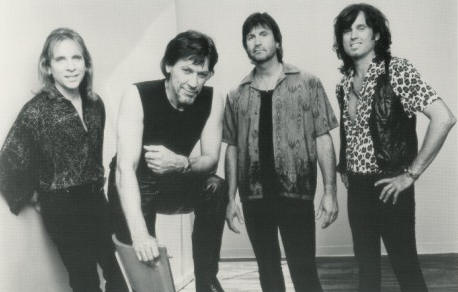|
|
Biography |
|
Biography "The central theme of Feed The Fire," says John Kay, "is, 'don't let the bastards get you down!'" Lyrically, songs such as "Rock & Roll Rebels" and "Hold On" focus on the resiliency of the human spirit in spite of life's many setbacks. The title song speaks to the needs of the inner flame that burns in all of us and drives us in our quest for fulfillment. Other tracks, such as "Man On A Mission", "Rock Steady" and "Rage", are songs of defiance and passion, while "Bad Attitude" and "Give Me News I Can Use", rely on tongue-in-cheek and at times sardonic humor to make their point. In Kay's words: "This album is about and for all the rock and roll rebels, be they 14 or 54, who refuse to throw in the towel and who struggle to keep their dreams alive in the face of ever diminishing freedom." With Feed The Fire, their most potent album in years, Kay and company have written the newest chapter of the Steppenwolf legend. Kay has certainly lived the life of a rock and roll rebel himself. After a perilous midnight escape from post-war East Germany as a child, he grew up with a steady diet of Armed Forces Radio and became inspired by the likes of Little Richard and Chuck Berry. At age 13, John decided to make rock and roll his life. "Considering I was only 13, legally blind, spoke the wrong language and was on the wrong side of the ocean, maybe I was a little optimistic," he says. In spite of these considerable adversities, by his 14th birthday John miraculously found himself with guitar in hand on the other side of that ocean in Toronto, Canada. John learned English from the speed rapping disc jockeys and music from the artists of the day, and he began to perform on amateur radio shows in his mid-teens. After high school, John roamed the American continent performing acoustic blues in coffee houses and bars. He soon met and joined the Canadian band "The Sparrow" while playing in Toronto's Yorkville Village in 1965. The group, migrating from Toronto to New York and later to San Francisco, became part of the Bay Area music scene. The Sparrow broke up in 1967, after several unsuccessful attempts at recording for Columbia Records. A couple of months later, John formed Steppenwolf in Los Angeles. Powered by his gritty vocals, the band's blues-based rock burst upon an unsuspecting public in the summer of 1968, creating timeless classics as "Born To Be Wild", "Magic Carpet Ride", "The Pusher", and "Rock Me." Following Kay's decision to break up the band in the mid 70's, he embarked on a solo career that saw the release of albums such as Forgotten Songs and Unsung Heroes, My Sportin' Life, and All In Good Time. In the late 70's John learned that several bogus groups, using the name Steppenwolf, were touring and trashing the very reputation of the band that Kay had created. In 1980 he decided to act and the John Kay Band quickly became John Kay and Steppenwolf. Several years of intensive touring followed and resulted in the rebuilding of the name. Since the early 80's, the group has featured the considerable talents of John's co-producing and writing partner, Michael Wilk (keyboards/bass/vocals) and long time drummer/vocalist Ron Hurst. Recently, they were joined by newest member, lead guitarist/vocalist, Danny Johnson. Since re-establishing the name, John Kay and Steppenwolf have released five albums and have toured annually on a worldwide basis. In 1994, Kay returned triumphantly with the Wolf to play concerts in the former East Germany, where he was reunited with friends and relatives he had not seen since he was 4 years-old. With sales in excess of 20 million units worldwide (and increasing annually) and songs licensed for use in 37 motion pictures and 36 television programs (as of this writing), the group continues to focus on the future. Recent projects and activities include:
"Looking back, it has always been my inner fire that has pushed me to overcome life's obstacles and allowed me to realize my dreams," says Kay. |
|
